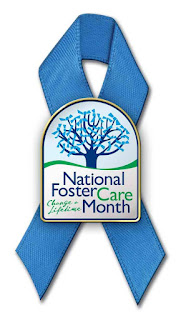Family matters: Especially for young people in foster care
What families look like today has
changed. Even the definition of family has evolved. That's a good thing. It's
no longer the nuclear family model with a mom and dad. It may be two moms, two
dads, grandparents or extended family members serving as legal guardians. Those
who you call family may have no blood relation at all. It may be close friends,
a social worker, a teacher or another caring person in your life.
 What hasn't change is there's no
perfect family. We have disagreements. We have fights. We face uncertainty. We
struggle. The day in the life of any family can feel like a roller coaster
ride. But families also have to power to unite, provide love, support and
foster a sense of belonging. We build lifelong bonds with those we call family.
What hasn't change is there's no
perfect family. We have disagreements. We have fights. We face uncertainty. We
struggle. The day in the life of any family can feel like a roller coaster
ride. But families also have to power to unite, provide love, support and
foster a sense of belonging. We build lifelong bonds with those we call family.Did you know there are approximately 400,000 children in foster care in the U.S? How these young people define family is complicated. They're forced to navigate a child welfare system that's struggling with the role of being a parent. And this same system is also trying to help them potentially reconnect with their birth family. If that’s not an option then connect them to family members like a grandparent, aunt or uncle. And when that’s not possible they’re placing with a foster family.
It's a system of organized chaos for
too many of our young people living in foster care. Here's some chilling stats:
- Each year, more than 23,000 youth will age out of the foster care system when they turn 18 or 21, or when they finish high school (depending upon the state in which they live). These children are at increased risk of poor educational outcomes, homelessness, and unemployment.
- After reaching the age of 18, 20% of the young people who were in foster care will become instantly homeless.
- Seven out of 10 girls who age out of the foster care system will become pregnant before the age of 21.
- There is less than a 3% chance for young people who have aged out of foster care to earn a college degree at any point in their life.
- Only one out of every two foster kids who age out will have some form of gainful employment by the age of 24.
When I worked at the Annie E. Casey Foundation
I had the privilege of meeting numerous young people from foster
care. Before this job I wasn't aware of the key stats shown above. I also
didn't realize the complexities within our nation's child welfare system. If
adults are struggling to run this system and meet the needs of kids, where does
this leave the kids?
There are no easy answers. It's
never black or white when tackling the work of creating better outcomes for the
young people in foster care. Young people in foster care have taught me you
can't give up. Good work is being done by advocates, child welfare professionals,
foster parents, politicians, and young people in care.
I've witnessed their resilience.
It's undeniably empowering. The stories of overcoming adversity in their lives
has created a road map of lessons learned. We have to make sure we're
listening. While the definition of family has changed, the need for more
families to help find forever homes for young people in foster care has not.
As National Foster Care Month comes to a close, take
a moment to think about your own definition of family. Then ask yourself how you
can be a resource for a young person in foster care. Remember, love, support,
and families wanted.
Comments